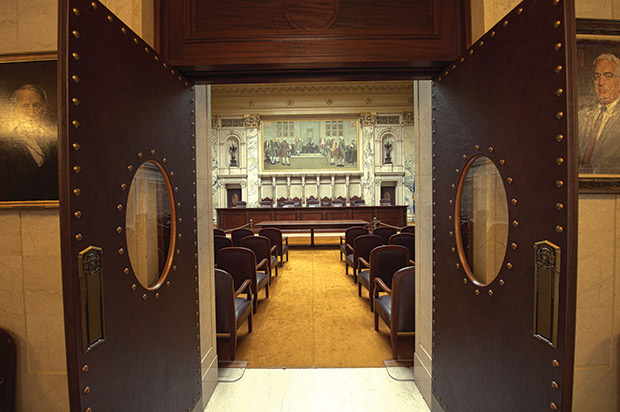Efficient and economical form of ADR? It depends …
By: WISCONSIN LAW JOURNAL STAFF//December 21, 2016//
Efficient and economical form of ADR? It depends …
By: WISCONSIN LAW JOURNAL STAFF//December 21, 2016//
By Robert D. Cohan and Jamie N. Hage

Although arbitration is generally regarded as an efficient and economical system of alternative dispute resolution, the standard of judicial review for arbitration awards varies from state to state.
What’s more, the Federal Arbitration Act, 9 U.S.C. §§10-11, provides its own, very narrow, standard of review, which some states follow.
When you’re contemplating an arbitration clause in an agreement, a necessary concern should be the standard of judicial review to which an arbitration award will be subjected.
It is important to consider: Does your client want an efficient and economical resolution of a dispute? Or would the client prefer to preserve a right to appeal an award in response to a plain mistake of law?
If it is indeed a quick and relatively inexpensive resolution that he wants, then he should known he may have to surrender his appellate rights.
A second necessity, if the preservation of appellate rights is paramount, is to choose an arbitrator who understands the law.
Two recent cases from Massachusetts and New Hampshire present a study in contrasts.
In Finn v. Ballentine, the New Hampshire Supreme Court affirmed a Superior Court decision that vacated an arbitration award on the grounds that the arbitrator had made a “plain mistake of law.”
Under New Hampshire law, the Superior Court may modify or vacate an award “for plain mistake, or … fraud, corruption, or misconduct by the arbitrators, or on the grounds that the arbitrators exceeded their powers.”
The “plain mistake” standard permits New Hampshire courts to vacate awards if they find that “an arbitrator misapplied the law to the facts.”
The plaintiff argued that the much narrower FAA standard of review should have applied in the case because it superseded New Hampshire state law.
That FAA standard provides that courts can disturb an arbitrator’s award only in the event that: (1) an award was procured by corruption, fraud or undue means; (2) there was evident partiality or corruption on the part of the arbitrator; (3) there was misconduct by the arbitrator in conducting the hearing, such that a party was prejudiced; or (4) the arbitrator exceeded his power or failed to make a mutual, final and definite award.
The New Hampshire Supreme Court disagreed, ruling that the U.S. Supreme Court has yet to explicitly state that the FAA standard of review supersedes state standards, and that the New Hampshire standard should apply. The Superior Court’s decision vacating the award for a plain mistake of law was affirmed.
Here, we should point out that it is unlikely that the award would have been overturned had the FAA standard of review been applied.
Also, note the arbitration award in Finn was entered on Nov. 25, 2014. The Superior Court vacated the award on May 14, 2015, and the New Hampshire Supreme Court affirmed that reversal on Jan. 27, 2016 — more than a year after the award had been entered. Arbitration in New Hampshire, at least in Finn, was neither efficient nor economical.
Because the standard of review established by the New Hampshire statute is much less deferential to arbitrators’ decisions, it can provide your client with more favorable grounds to appeal an unfavorable award. That comes with the sacrifice of the speed and costs savings that are normally the reasons for choosing arbitration in the first place.
Until there is a uniform standard for appellate reviews of arbitration awards, lawyers should be aware of how the choice of governing law provisions can affect dispute resolutions.

The FAA imposes a restrictive standard of review, and it has superseded the law of many states that are less restrictive. Under federal law, a “mere mistake of law by an arbitrator cannot serve as the basis for judicial review.” Dennis v. Wachovia Securities, LLC, 429 F. Supp. 2d 281, 288 (D. Mass. 2006).
As noted by the New Hampshire Superior Court, “this view of the law is different from that taken by the New Hampshire Supreme Court, which affords no deference to an arbitrator’s determination as to what the controlling law is.” Finn v. Ballentine Partners, LLC, No. 2013-CV-012, 2015 N.H. Super. LEXIS 3, at *15 (N.H. Super. Ct. April 9, 2015).
It is well established in many jurisdictions that, when a state statute provides “lesser protection for arbitration agreements and awards,” it is superseded by the provisions of the FAA. Thomas Diaz, Inc. v. Columbina S.A., 831 F. Supp. 2d 528, 532 n.1 (D.P.R. 2011).
It is common in other states for a conflict between state and federal standards of review to exist, but it is not the norm. As observed by the Florida Supreme Court, “it makes more sense” to have a “national policy favoring arbitration with just the limited review needed to maintain arbitration’s essential virtue of resolving disputes straightaway.” Visiting Nurses Ass’n of Florida Inc. v. Jupiter Med., Inc., 154 So. 3d 1115, 1132 (Fla. 2014).
Given the vagaries and variances in state laws, there are several considerations to take into account when you are weighing whether to include an arbitration clause in an agreement. The first is: To what extent is your client willing to sacrifice his appellate rights in order to preserve arbitration as an efficient and economical resolution of disputes?
If your client wants to take a more efficient and economical course, be sure to know the laws of whatever state you plan to make use of arbitration in. Alternatively, you might simply make a stipulation stating that any appeal is subject to the FAA.
On the other hand, if your client wants to preserve his appellate rights in order to be protected from a plainly incorrect award, then selecting a state such as New Hampshire, with its less deferential law, is necessary.
No matter which state you choose, the selection of the arbitrator will also be a paramount concern. It is imperative to choose an arbitrator who is able to both understand and apply the law correctly.
In Finn, the arbitration panel included former New Hampshire Supreme Court Chief Justice John T. Broderick. One would think that he would craft an award that would not include a “mistake of law.” And yet, the state Supreme Court said that is exactly what happened. Finn, No. 2015-0332, at *32.
With a nod to Broderick’s stature as a jurist, the court stated that it is under no obligation to “assume proper application of the law from the panel members’ resumes.” Id. Even the careful selection of an arbitrator who is well versed in the law is no guarantee the award will be affirmed.
Until there is a uniform standard for appellate reviews of arbitration awards, attorneys should be aware of how choices of governing law provisions may affect dispute resolutions. Without a uniform standard that narrows the opportunities for appellate review, it may not be advantageous to clients to have arbitration clauses in contracts.
Legal News
- Wisconsin attorney loses law license, ordered to pay $16K fine
- Former Wisconsin police officer charged with 5 bestiality felony counts
- Judge reject’s Trump’s bid for a new trial in $83.3 million E. Jean Carroll defamation case
- Dozens of deaths reveal risks of injecting sedatives into people restrained by police
- The Latest: Supreme Court arguments conclude in Trump immunity case
- Net neutrality restored as FCC votes to regulate internet providers
- Wisconsin Attorney General asks Congress to expand reproductive health services
- Attorney General Kaul releases update at three-year anniversary of clergy and faith leader abuse initiative
- State Bar leaders remain deeply divided over special purpose trust
- Former Wisconsin college chancellor fired over porn career is fighting to keep his faculty post
- Pecker says he pledged to be Trump campaign’s ‘eyes and ears’ during 2016 race
- A conservative quest to limit diversity programs gains momentum in states
WLJ People
- Power 30 Personal Injury Attorneys – Russell Nicolet
- Power 30 Personal Injury Attorneys – Benjamin Nicolet
- Power 30 Personal Injury Attorneys – Dustin T. Woehl
- Power 30 Personal Injury Attorneys – Katherine Metzger
- Power 30 Personal Injury Attorneys – Joseph Ryan
- Power 30 Personal Injury Attorneys – James M. Ryan
- Power 30 Personal Injury Attorneys – Dana Wachs
- Power 30 Personal Injury Attorneys – Mark L. Thomsen
- Power 30 Personal Injury Attorneys – Matthew Lein
- Power 30 Personal Injury Attorneys – Jeffrey A. Pitman
- Power 30 Personal Injury Attorneys – William Pemberton
- Power 30 Personal Injury Attorneys – Howard S. Sicula







